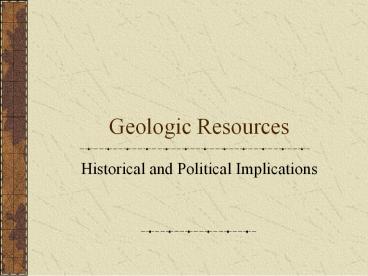Geologic Resources - PowerPoint PPT Presentation
Title:
Geologic Resources
Description:
Geologic Resources Historical and Political Implications – PowerPoint PPT presentation
Number of Views:120
Avg rating:3.0/5.0
Title: Geologic Resources
1
Geologic Resources
- Historical and Political Implications
2
What are geologic resources?
- Metal-bearing minerals
- Non-metallic minerals
- Fossil Fuels
- Coal
- Oil
- Natural Gas
- Water
3
Uses of Geologic Resources
- Minerals composition source of particular
elements - Minerals physical properties specific uses
- Fossil Fuels heat, vehicles and industry
- Water obvious!
4
Global Distribution of Geologic Resources
- Distribution is uneven
- Occurrences are a result of geologic history,
especially past and present plate tectonic
processes - Some nations have a rich supply of geologic
resources - Others have few or none
- Nations trade, import, export, make treaties or
go to war over geologic resources
5
What do these have in common?
- The Industrial Revolution
- Pearl Harbor
- The blinding of the cyclops, Polyphemus
- California and the Civil War
- South Africa and U.S. foreign policy
- Classical Greek Civilization
- Hitlers invasion of Poland
6
Answer
- They are all examples of the relationship between
geologic resources, history and politics!
7
Classical Greek Civilization
- The Bronze Age
- Bronze an alloy of copper and tin
- Made possible weapons and tools
- Trade for metals and other commodities helped
build Greek city states - Copper from Kupros, now known as Cyprus
8
The blinding of Polyphemus
- Homer describes Odysseus using an iron-shod
wooden pole to blind the cyclops, so that he and
his men can escape. - Iron was not commonly used at this time the
period was known as the Bronze Age.
9
Industrial Revolution
- Why did the Industrial Revolution begin in Great
Britain? - Why did Germany and France follow rather quickly
with industrialization, while nations like Italy
and Spain followed more slowly? - The answer, in part, pertains to the large
resources of iron ores and coal in England,
France and Germany.
10
California and the Civil War
- Gold was discovered at Sutters Mill in
California in 1848. - The great California Gold Rush began in 1849.
- This prompted a massive migration westward in the
U.S. - What does this have to do with the Civil War in
the 1860s?
11
California and the Civil War
- The South felt that they could probably match the
North militarily for awhile, but not in direct
conflict. - Part of the Souths war plan was to prolong the
war long enough until - Political support for the war in the North
weakened or - The Norths economy would falter under the
sustained cost of the war
12
California and the Civil War
- The South failed to account for the steady supply
of wealth that California gold pumped into the
Norths economy. - Gold from California financed the Norths war
effort.
13
California and the Civil War
- California gold, along with the Norths superior
industrial base (especially iron) assured the
Norths final victory.
14
Why did Japan attack Pearl Harbor?
- Why a sneak attack?
- Why Hawaii?
- Why the United States?
- The answers are complex, but involve the
interplay of the U.S. Pacific fleet, U.S. foreign
policy and Japans lack of geologic resources.
15
Japan and the approachto Pearl Harbor
- In the 1930s, Japan embarked on imperial
expansion, with military conquests in China,
Southeast Asia and many Pacific Archipelagoes. - Japan lacked many critical geologic resources
chiefly iron and oil. - Iron and oil are critical to military operations
and industry.
16
Japan and the approachto Pearl Harbor
- The U.S. government opposed Japanese colonial
expansion and placed an embargo on export of iron
and oil to Japan in 1940. - In July of 1941, the U.S. placed a total embargo
on Japan. - Less than six months later, Japan attempted to
destroy U.S. Pacific fleet in Hawaii the only
military presence in the Pacific that could
hinder Japans continued conquest for resources.
17
Hitlers Invasion of Poland
- Why Poland?
- Why not a stronger military power like France
that could have interfered with the overall plan
of conquest?
18
Hitlers Invasion of Poland
- Poland has vast resources of iron and coal
- Both were necessary to sustain a prolonged period
of empire-building.
19
South Africa andU.S. foreign policy
- The U.S. condemned apartheid in South Africa, but
continued to trade with South Africa despite an
official boycott. - Why?
20
South Africa andU.S. foreign policy
- South Africa supplies
- 55 of the Wests Gold
- 47 of the Wests Chromium
- 40 of the Wests Manganese
- 80 of the Wests Platinum Group metals
- South Africa trans-ships more than half of the
worlds Cobalt - Most of the Worlds Diamonds
21
South Africa andU.S. foreign policy
- U.S. moral objections to apartheid were set
aside. We continued to do business with the
white minority government for reasons having to
do with economics and national security (need for
strategic minerals).
22
Conclusions
- There is a close link between history, politics
and geologic resources - In many cases, it can be shown that geologic
resources are primary factors in determining
historical events. - These linkages exist because geologic resources
are not evenly distributed around the world































